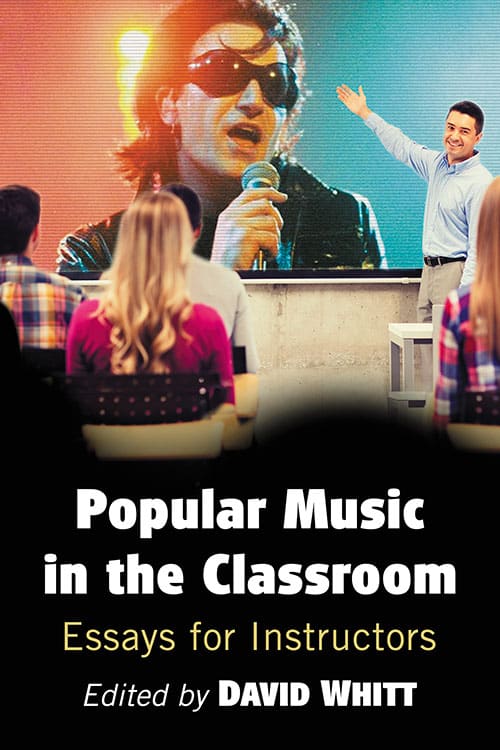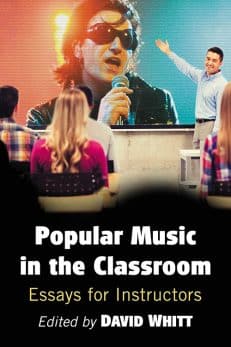Popular Music in the Classroom
Essays for Instructors
$45.00
In stock
About the Book
Popular music has long been a subject of academic inquiry, with college courses taught on Elvis Presley, Bob Dylan, and the Beatles, along with more contemporary artists like Beyoncé and Outkast. This collection of essays draws upon the knowledge and expertise of instructors from a variety of disciplines who have taught classes on popular music. Topics include: the analysis of music genres such as American folk, Latin American protest music, and Black music; exploring the musical catalog and socio-cultural relevance of specific artists; and discussing how popular music can be used to teach subjects such as history, identity, race, gender, and politics. Instructional strategies for educators are provided.
About the Author(s)
David Whitt is a professor of communication studies at Nebraska Wesleyan University in Lincoln, Nebraska. He teaches mass media, persuasion, communication in the professions, and has taught courses on Star Trek, comic books, and the Irish rock group U2.
Bibliographic Details
Edited by David Whitt
Format: softcover (6 x 9)
Pages: 257
Bibliographic Info: bibliographies, index
Copyright Date: 2020
pISBN: 978-1-4766-7157-4
eISBN: 978-1-4766-3889-8
Imprint: McFarland
Table of Contents
Acknowledgments vi
Introduction (David Whitt) 1
Part 1: Popular Music History and Genres
Highway 61: Alan Lomax and the Mythology of the Road in American Folk Music (Raymond Blanton) 7
“There is no revolution without songs”: Teaching Latin American Resistance Music in the Spanish Curriculum (Eunice Rojas) 23
Teaching the Music of Sunshine and Noir California: From “California Dreamin’” to “Straight Outta Compton” (Shawn Schwaller) 38
Remembering Tomorrow: Exploring the Deeper Transatlantic Story of the Birth of the Psychedelic Sixties (Tom Zlabinger) 53
Globalizing Jamaican Music: From Reggae to New Wave (William M. Knoblauch) 72
Teaching Black Music as a Living Tradition: Pedagogically Connecting the Past to the Present (Justin Patch) 85
Part 2: Artists and Icons
Good Rockin’ in the Classroom: Teaching Elvis Presley and Popular Music (Jay Scott Chipman) 103
Teaching the Beatles! (Jeff Mohr) 116
People, Hell and Angels: The Sociocultural Contributions to the Rise and Demise of Jimi Hendrix (Ignatius Calabria) 129
Songs of Ascent: Teaching the History, Music and Activism of U2 (David Whitt) 146
Part 3: Popular Music Analysis and Other Instructional Tools
Musical Identities: Teaching Race, Class and Gender Through Popular Music (James L. Deys and Jacob A. Dickerson) 163
Patriarchy, Cross-Dressing, Agency and Violence: Women and the Pedagogical Opportunities in Heavy Metal (Daniel Guberman) 178
Music and Protest: Dissecting and Creating Social and Political Music (Michael W. McFarland) 194
Can Bro-Country Kill Your Parents? Using Shifting Musical Taste to Explore the Relationship of Youth and Parent Cultures (Charles R. Warner) 207
Game-Based Learning in the Popular Music Classroom (Brian Robison) 222
About the Contributors 243
Index 245
Book Reviews & Awards
• “This timely compilation shows the part popular music plays in globalization, political resistance, and activism, and how it is relevant to broad issues surrounding race, class, and gender. Many of the lessons Whitt includes can be used for online projects for individual students, or as units for social science, communication, and music history courses. …A fun read and a useful, in-depth resource….recommended”—Choice
• “There are no overnight wonders in music stardom. Take it from me, it takes years of hard work and life’s tribulations to make a lasting statement. I lived and made my mark during much of the time highlighted in this book. David Whitt and his crew of professors, hell bent on inculcating the deep connection between popular music and history, offer up a diverse menu of learning tools, from the origins of music and the role of the artist in society, to the geographical, cultural, and historical implications, and how to understand music through different techniques and strategies. Using popular music of all genres, they transport you to a destination where one will be able to experience the art of listening and learning. I highly recommend this resource to fans of music, historians and musicians as it gave me many different views of my era. So many of my mentors past and present are happy to know that this field of academia exists.”—Jerry Jemmott, Multi Grammy Nominated and Awarded Session Bassist- King Curtis, Aretha Franklin, BB King





